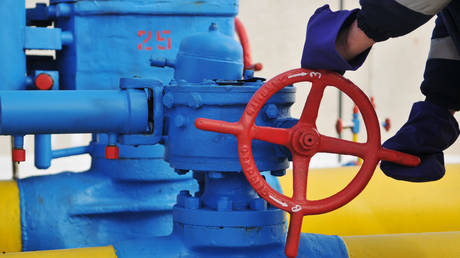
EU working to completely stop Russian gas transit via Ukraine – official
The current five-year contract between Moscow and Kiev is due to expire at the end of this year
The European Commission is working hard to abandon Russian gas supplies that it receives through Ukraine, the commission’s spokesperson, Tim McPhie, has said. The EU’s gas transit contract with Moscow expires at the end of this year.
According to McPhie, the total transit volume to such EU nations as Austria, Slovakia, the Czech Republic, and Italy, currently amounts to about 15 billion cubic meters (bcm) a year.
“The European Commission is working closely with these countries to ensure that they have the necessary gas supplies,” McPhie said. “I will not talk about specific routes, but we are talking about ensuring that these countries can receive gas through other gas pipelines, as well as liquefied natural gas, and we are confident that it’s possible,” he told a briefing in Brussels on Wednesday.
Brokered by the EU, the current five-year contract between Russia and Ukraine was signed in 2019 just 24 hours before the previous agreement was due to expire. Under the deal, Russian energy giant Gazprom agreed to transit 65 billion cubic meters of gas through Ukraine in 2020, and 40 billion annually between 2021 and 2024. The transit line through Ukraine and the European arm of TurkStream are the only two remaining conduits for piped Russian gas to reach Central and Western Europe.
However, European Energy Commissioner Kadri Simson told an EU Parliament committee meeting earlier this month that the bloc has no intention of extending the current gas transit contract with Russia via Ukraine.
READ MORE: Russian pipeline gas supplies to EU rise 41% year-on-year – Vedomosti
The EU plans to completely phase out energy imports from Russia by 2027. However, many member states still greatly rely on gas flows from the sanctioned country – particularly Austria and Hungary. While most EU countries slashed imports of Russian gas over the Ukraine conflict, Austria, which covers about 80% of its domestic consumption with fuel from Russia, actually ramped up purchases.
Austrian Chancellor Karl Nehammer said recently that the country may one day do without Russian gas, but this is unlikely to happen in the short term. For the time being, Vienna will continue to buy fuel from Moscow, he stressed. Nehammer pointed out that Austria’s largest gas provider, OMV, has contracts signed with Gazprom until 2040 and cannot simply pull out of those at the stroke of a pen.
For more stories on economy & finance visit RT’s business section


